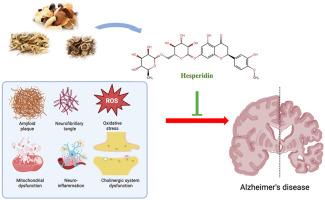当前位置:
X-MOL 学术
›
Eur. J. Med. Chem.
›
论文详情
Our official English website, www.x-mol.net, welcomes your
feedback! (Note: you will need to create a separate account there.)
Efficacy and molecular mechanisms of hesperidin in mitigating Alzheimer's disease: A systematic review
European Journal of Medicinal Chemistry ( IF 6.0 ) Pub Date : 2024-12-04 , DOI: 10.1016/j.ejmech.2024.117144 Xu Han, Yuting Zhang, Lijuan Zhang, Yanyan Zhuang, Yu Wang
European Journal of Medicinal Chemistry ( IF 6.0 ) Pub Date : 2024-12-04 , DOI: 10.1016/j.ejmech.2024.117144 Xu Han, Yuting Zhang, Lijuan Zhang, Yanyan Zhuang, Yu Wang

|
Hesperidin, a flavonoid glycoside, is a natural phenolic compound that has broad biological effects. Increasing evidence suggests that hesperidin inhibits the occurrence and development of neurodegenerative diseases, including Alzheimer's disease (AD). This article reviews the neuropharmacological mechanisms of hesperidin in the prevention and treatment of AD through in vitro and in vivo studies. A systematic review of preclinical studies was conducted using PubMed, Web of Science, Scopus, and Google Scholar (up to July 1, 2024). The neuroprotective potential of hesperidin was mediated through mechanisms such as inhibition of β-amyloid (Aβ) aggregation, enhancement of endogenous antioxidant defense functions, reduction of neuroinflammation and apoptosis, improvement of mitochondrial dysfunction, regulation of autophagy, and promotion of neurogenesis. Despite various preclinical studies on the role of hesperidin in AD, its exact effects on humans remain unclear. Few clinical trials have indicated that dietary supplements rich in hesperidin can improve cerebral blood flow, cognition, and memory performance. The neuroprotective effect of hesperidin may be exerted via regulating different molecular pathways, including the RAGE/NF-κB, Akt/Nrf2, and AMPK/BDNF/CREB pathways. However, further clinical trials are needed to confirm the neuroprotective effects of this natural flavonoid compound and to assess its safety.
中文翻译:

橙皮苷缓解阿尔茨海默病的疗效和分子机制:系统评价
橙皮苷是一种类黄酮糖苷,是一种天然酚类化合物,具有广泛的生物学效应。越来越多的证据表明,橙皮苷抑制神经退行性疾病的发生和发展,包括阿尔茨海默病 (AD)。本文通过体外和体内研究综述了橙皮苷预防和治疗 AD 的神经药理学机制。使用 PubMed、Web of Science、Scopus 和 Google Scholar 对临床前研究进行了系统评价(截至 2024 年 7 月 1 日)。橙皮苷的神经保护潜力是通过抑制 β-淀粉样蛋白 (Aβ) 聚集、增强内源性抗氧化防御功能、减少神经炎症和细胞凋亡、改善线粒体功能障碍、调节自噬和促进神经发生等机制介导的。尽管对橙皮苷在 AD 中的作用进行了各种临床前研究,但其对人类的确切影响仍不清楚。很少有临床试验表明,富含橙皮苷的膳食补充剂可以改善脑血流量、认知和记忆能力。橙皮苷的神经保护作用可通过调节不同的分子途径发挥,包括 RAGE/NF-κB、Akt/Nrf2 和 AMPK/BDNF/CREB 途径。然而,需要进一步的临床试验来证实这种天然类黄酮化合物的神经保护作用并评估其安全性。
更新日期:2024-12-04
中文翻译:

橙皮苷缓解阿尔茨海默病的疗效和分子机制:系统评价
橙皮苷是一种类黄酮糖苷,是一种天然酚类化合物,具有广泛的生物学效应。越来越多的证据表明,橙皮苷抑制神经退行性疾病的发生和发展,包括阿尔茨海默病 (AD)。本文通过体外和体内研究综述了橙皮苷预防和治疗 AD 的神经药理学机制。使用 PubMed、Web of Science、Scopus 和 Google Scholar 对临床前研究进行了系统评价(截至 2024 年 7 月 1 日)。橙皮苷的神经保护潜力是通过抑制 β-淀粉样蛋白 (Aβ) 聚集、增强内源性抗氧化防御功能、减少神经炎症和细胞凋亡、改善线粒体功能障碍、调节自噬和促进神经发生等机制介导的。尽管对橙皮苷在 AD 中的作用进行了各种临床前研究,但其对人类的确切影响仍不清楚。很少有临床试验表明,富含橙皮苷的膳食补充剂可以改善脑血流量、认知和记忆能力。橙皮苷的神经保护作用可通过调节不同的分子途径发挥,包括 RAGE/NF-κB、Akt/Nrf2 和 AMPK/BDNF/CREB 途径。然而,需要进一步的临床试验来证实这种天然类黄酮化合物的神经保护作用并评估其安全性。






























 京公网安备 11010802027423号
京公网安备 11010802027423号